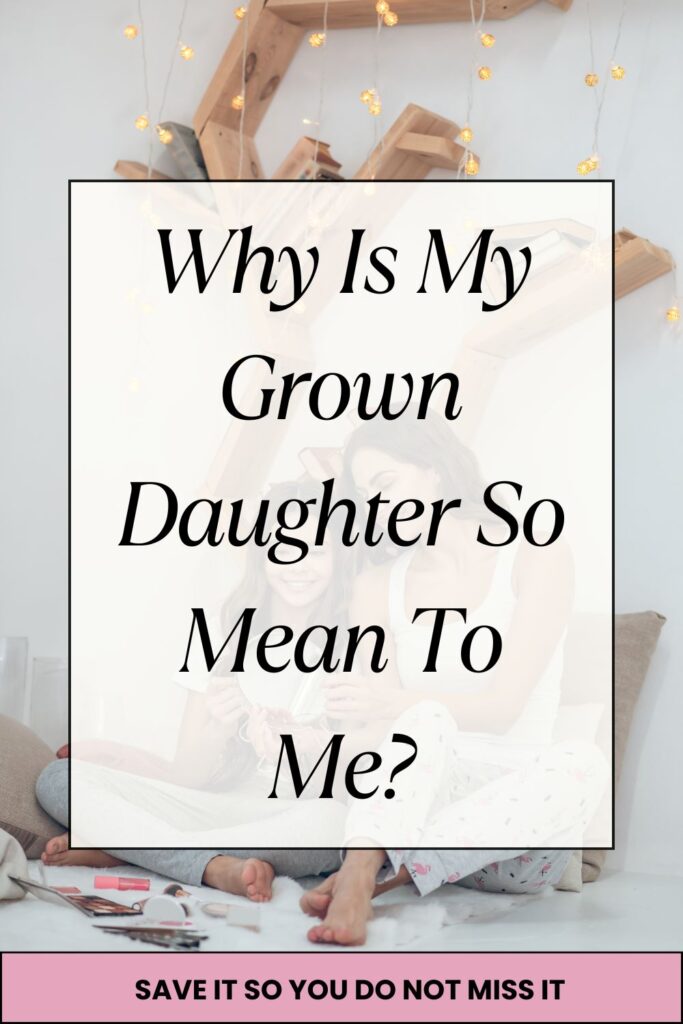It’s one of the most painful questions a mother can ask:
“Why is my grown daughter so mean to me?”
You gave her everything you could — love, time, sacrifice, and support. You were there through scraped knees, broken hearts, and big milestones. Now that she’s grown, independent, and building her own life, you might have expected a deeper bond or at least mutual respect. Instead, you’re met with distance, coldness, or even open hostility.
If this sounds like your reality, you’re not alone.
Many mothers silently suffer through complicated and strained relationships with their adult daughters. And while no two families are the same, there are often underlying emotional patterns, unmet needs, or unspoken hurts that lead to this kind of behavior. Sometimes, it’s about boundaries. Other times, it’s about unresolved resentment or unexpressed expectations from both sides.
This article isn’t about blame. It’s about clarity and healing.
We’re going to gently explore 10 real reasons why your daughter might be acting distant or harsh. Each point is designed to give you insight into her possible mindset — and maybe even into your own responses and needs. These reflections aren’t meant to guilt you but to empower you with understanding.
Whether your daughter is short-tempered, critical, or completely shuts you out, understanding where it’s coming from is the first step toward restoring peace — both in your relationship and in your heart.

Let’s uncover what might really be going on behind her words, actions, and silences.
1. She Feels Emotionally Unheard or Invalidated
Your daughter may have spent years feeling like her emotions were dismissed or minimized — even if you never intended to do that.
Perhaps when she came to you crying as a child, you told her to “toughen up” because you wanted her to be strong. Maybe when she shared difficult feelings as a teen, you tried to fix the problem instead of sitting with her in the discomfort. Over time, these moments can add up, making her feel emotionally invisible.
As an adult, she may now express those wounds through sarcasm, criticism, or detachment. It’s a defense mechanism, often rooted in the need to protect herself from further emotional pain.
This doesn’t mean you were a bad parent — it just means there may be emotional gaps between what you meant and how she received it. She might still be carrying the weight of feeling unheard, and now that she has more emotional independence, she’s using her voice in ways that seem sharp or disrespectful.
Try to approach her from a space of listening, not correcting. The more she feels heard, the less she may feel the need to act out her hurt.
2. She’s Struggling With Her Own Mental Health
When someone is battling anxiety, depression, or unresolved trauma, it often spills into their relationships — especially with the people closest to them.
If your daughter is dealing with mental health challenges, her behavior may come off as mean, irritable, or emotionally closed-off. You may be the safest person to receive that overflow, even if it’s unfair to you. She might lash out because she doesn’t know how else to cope.
In some cases, she might not even be fully aware of how her mood swings, emotional reactivity, or coldness are impacting you. Emotional pain can distort perception, making even neutral conversations feel like attacks.
Mental health struggles don’t excuse cruelty, but they do offer an explanation.
Gently encouraging her to seek support, or letting her know that you’re available if she ever wants to talk, can open a door — even if she doesn’t walk through it right away. Compassion, paired with healthy boundaries, can sometimes soften the edges of her inner battles.
3. She’s Trying to Establish Boundaries — and Doesn’t Know How
Boundary-setting can be uncomfortable, especially in families where emotional closeness was expected at all times. If your daughter is trying to carve out emotional or physical space, she might come off as mean — but it could be her way of drawing lines she never learned to express clearly.
She may need more independence, or she might want to change how often you talk or how much influence you have over her decisions. When people don’t know how to communicate their needs kindly, they often default to distance or defensiveness.
Her actions might not be about rejecting you — but about reclaiming her own sense of identity.
If you find yourself feeling shut out or resented, consider asking her what boundaries she’s trying to set. Let her know you want to respect her space, even if it hurts. That simple acknowledgment might reduce the emotional tension between you both.
4. She’s Carrying Unresolved Childhood Resentment
Even in loving homes, misunderstandings happen. And sometimes, children internalize events differently than parents remember them.
Maybe there was a divorce, favoritism (real or perceived), or an emotionally distant period during her teenage years. Even if you thought things had been smoothed over, your daughter might still carry unresolved feelings. These feelings can fester into passive-aggression, blame, or outbursts that seem disproportionate.
What you see as cruelty might be her way of expressing hurt that she never felt safe enough to share.
Opening space for her to speak — without getting defensive — can be powerful. You don’t have to agree with her version of events, but validating that her feelings are real and worthy of compassion may allow healing to begin.
5. She Feels Like You’re Still Trying to Control Her Life
It’s natural for parents to worry or offer advice, even after their children become adults. But to your daughter, it might feel like you’re still trying to steer her decisions or criticize her choices — even with the best intentions.
She might interpret your suggestions as judgments or your check-ins as micromanagement. If she reacts with anger or coldness, she may be trying to push back against what she sees as control, not care.
To rebuild trust, allow her to come to you when she needs guidance. Respect her right to make mistakes or take a different path. When she feels truly trusted, she may no longer need to defend herself with distance.
6. She’s Projecting Her Own Guilt or Shame Onto You
Sometimes, daughters act mean because they feel guilty about their own behavior.
Maybe she doesn’t call as often as she thinks she should. Maybe she regrets something she said or feels overwhelmed by life and resents how much is expected of her. That guilt can morph into defensiveness or anger — and you end up becoming the emotional punching bag.
Instead of confronting her shame, she pushes you away to protect herself from feeling worse.
This doesn’t mean you should accept bad treatment, but recognizing this dynamic can help you respond with calm instead of escalation. A gentle, loving presence may eventually help her lower her guard and return with a more open heart.
7. She’s Influenced by Outside Relationships
Sometimes a daughter’s behavior shifts because of who she’s surrounding herself with — a partner, friends, or even in-laws who don’t respect you or your role in her life.
In these situations, she may be acting out of loyalty, pressure, or fear of conflict within her current relationships. It might have nothing to do with your worth or what kind of parent you were.
If you suspect someone else is influencing her perspective, try not to go on the offensive. That usually drives daughters further away. Focus on maintaining open, kind communication with her — so she always has a safe place to return when she’s ready.
8. She Feels You Don’t Accept Her For Who She Is
Whether it’s her lifestyle, career, partner, parenting style, or personal beliefs — your daughter might feel like she’s constantly being judged or compared.
Even subtle comments like “I wouldn’t do it that way” or “When I was your age…” can create emotional distance if she feels they’re laced with disapproval. Over time, she may develop resentment or feel like she can never be “enough” in your eyes.
The result? She lashes out or shuts down emotionally.
One of the most healing gifts you can offer her is unconditional acceptance. Let her know — with your words and actions — that she doesn’t have to earn your approval. That shift can open a door to reconnection.
9. She’s Overwhelmed By Adulthood and Taking It Out On You
Being a grown-up isn’t easy — and some daughters find themselves juggling too much. Between career pressures, financial stress, parenting challenges, or health issues, life can become overwhelming. When she doesn’t have healthy coping tools, your daughter might vent her frustrations on you.
Why you? Because you’re her emotional home — and sometimes people treat home with the least patience.
If her tone is sharp or her behavior feels dismissive, it might not be about you at all. It might be about everything else she’s carrying that day.
Respond with empathy — not enabling — and ask how you can support her emotionally, without taking on the weight of her life.
10. She’s Testing Whether the Relationship is Safe
Sometimes meanness isn’t just cruelty — it’s a test.
Your daughter may be trying to see if you’ll still love her when she’s not being pleasant. She might be afraid of abandonment, rejection, or not being worthy of love. So, she tests the relationship — unconsciously — by pulling away, being cold, or acting hurtful.
If you react with rejection, the cycle continues. If you respond with calm consistency and boundaries, she may slowly begin to feel safe again.
This kind of dynamic often stems from deeper wounds — and repairing it takes time, patience, and emotional safety.
Conclusion
Your relationship with your grown daughter is layered, emotional, and deeply rooted. If you’re asking yourself why she’s being so mean, it’s not because you’re weak or unlovable. It’s because something deeper may be trying to surface — for both of you.
As painful as it is, this tension can be a turning point. It can be an invitation to grow, reflect, and build something new. You can’t control how she acts, but you can choose how you show up: with love, compassion, and healthy boundaries.
Rebuilding trust doesn’t happen overnight, and sometimes it requires outside help like therapy, support groups, or honest conversations that don’t seek to “fix” but to understand.
Hold space for the possibility of healing. Let your daughter see that your love isn’t conditional, but it’s also not without self-respect. Sometimes, just being there without judgment — when she’s ready — can change everything.
You deserve peace. And with time, there’s hope for your bond to be restored — one honest moment at a time.
FAQs
1. How do I respond when my daughter is disrespectful?
Stay calm and set firm but loving boundaries. Let her know how her words affect you, but avoid escalating the conflict. Emotional control can help de-escalate tension and open space for future conversations.
2. Should I apologize even if I don’t know what I did wrong?
Sometimes yes — especially if your daughter feels hurt. A heartfelt apology like “I’m sorry if I ever made you feel unloved or unsupported” can begin to rebuild trust, even if you don’t fully understand her perspective.
3. What if my daughter cuts me off completely?
Give her the space she’s asking for, but don’t close the door. Send occasional messages of love or support without pressure. Over time, many daughters come back when they feel safe and unjudged.
4. Can therapy help our relationship?
Absolutely. Family therapy or individual counseling can provide tools, communication strategies, and emotional clarity. It often helps both sides feel seen, heard, and validated.
5. Is it okay to walk away from a toxic daughter?
If the relationship is abusive or consistently harmful to your mental health, it’s okay to protect your peace. Walking away doesn’t mean you’ve failed — it means you’re honoring your own emotional well-being.













